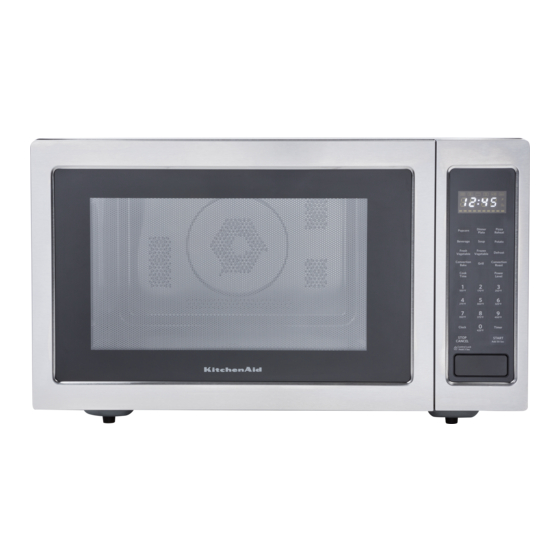KitchenAid KCMC1575 Manuel d'utilisation et d'entretien - Page 8
Parcourez en ligne ou téléchargez le pdf Manuel d'utilisation et d'entretien pour {nom_de_la_catégorie} KitchenAid KCMC1575. KitchenAid KCMC1575 20 pages. Microwave oven with convection

This isastandard 1 2-hour clock (1:00-12:59).
The Clock cannot
beerased. IftheClock isnotset,"0:00" w ill r emain i nthedisplay
when themicrowave oven isnotinuse.
To Set:
The microwave oven and Timer must be off.
1. Touch CLOCK.
2. Touch number pads to enter correct time of day.
3. Touch CLOCK.
The Timer can be set in minutes and seconds, up to 99 minutes
99 seconds, and counts down the set time.
NOTE: The Timer does not start or stop the microwave oven.
Cook functions may be used while the Timer is counting down.
When the cook function is active in the display, touch TIMER to
see the Timer count down for about 5 seconds.
To Set:
1. Touch TIMER.
2. Touch number pads to enter desired time.
3. Touch START.
When the set time ends, "End" will appear in the display and
the end-of-Timer
tones will sound.
4. Touch STOP CANCEL while the Timer is active in the display
to cancel the Timer.
The default display language is English, but may be set to
French. Two display messages are affected: "End" (English) or
"Fin" (French), and "door" (English) or "PrtE" ("porte" - French).
To Set Language
to French: With the microwave oven door
open, touch and hold number pad 1 for about 3 seconds, until a
tone sounds. Repeat to change back to English. The language
remains set after a power failure.
}7/
'
y
.....................
/v
<
I}i!}i
"
The default weight entry mode for Defrost is imperial (pounds),
but may be set to metric {grams). This setting does not affect any
other program besides Defrost. See "Defrost" section.
To Set Weight Entry to Metric: With the microwave oven door
open, touch and hold number pad 0 for about 3 seconds, until a
tone sounds. Repeat to change back to imperial. The mode
remains set after a power failure.
s,
£,, ¸¸,_s_ ¸,}
The Control Lock disables the control panel pads to avoid
unintended
use of the microwave oven.
To Lock/Unlock
Control:
The microwave oven must be off.
Touch and hold STOP CANCEL for about 3 seconds, until the
tone sounds and the control lock icon appears in the display.
Repeat to unlock.
If any control pad is touched while the control is locked, there will
be no response from the control.
MICROWAVE OVEN USE
A magnetron in the microwave oven produces microwaves which
reflect off the metal floor, walls and ceiling and pass through the
turntable and appropriate
cookware to the food. Microwaves are
attracted to and absorbed by fat, sugar and water molecules in
the food, causing them to move, producing friction and heat
which cooks the food.
•
To avoid damage to the microwave oven, do not lean on or
allow children to swing on the microwave oven door.
•
To avoid damage to the microwave oven, do not operate
microwave oven when it is empty.
•
Baby bottles and baby food jars should not be heated in
microwave oven.
•
Clothes, flowers, fruit, herbs, wood, gourds, paper, including
brown paper bags and newspaper, should not be dried in
microwave oven.
•
Paraffin wax will not melt in the microwave oven because it
does not absorb microwaves.
•
Use oven mitts or pot holders when removing containers from
microwave oven.
•
Do not overcook potatoes. At the end of the recommended
cook time, potatoes should be slightly firm. Let potatoes
stand for 5 minutes. They will finish cooking while standing.
•
Do not cook or reheat whole eggs inside the shell. Steam
buildup in whole eggs may cause them to burst, requiring
significant cleanup of microwave oven cavity. Cover poached
eggs and allow a standing time.
t,,,_
........
<_
[
,,;_
When microwave cooking, the amount, size and shape, starting
temperature,
composition
and density of the food affect cooking
results.
Amount of Food
The more food heated at once, the longer the cook time needed.
Check for doneness and add small increments of time if
necessary.
Size and Shape
Smaller pieces of food will cook more quickly than larger pieces,
and uniformly shaped foods cook more evenly than irregularly
shaped food.
Starting Temperature
Room temperature foods will heat faster than refrigerated foods,
and refrigerated foods will heat faster than frozen foods.
Composition
and Density
Foods high in fat and sugar will reach a higher temperature,
and
will heat faster than other foods. Heavy, dense foods, such as
meat and potatoes, require a longer cook time than the same size
of a light, porous food, such as cake.
8
